-
Paper Information
- Paper Submission
-
Journal Information
- About This Journal
- Editorial Board
- Current Issue
- Archive
- Author Guidelines
- Contact Us
American Journal of Sociological Research
p-ISSN: 2166-5443 e-ISSN: 2166-5451
2014; 4(5): 143-151
doi:10.5923/j.sociology.20140405.03
The Socioeconomic Status of the Students at the Faculty of Pedagogy in Skopje and the Motivation to Choose the Teaching Profession
Rozalina Popova-Koskarova, Emil Sulejmani
University of “Sts. Cyril and Methodius”, Faculty of Pedagogy “Sts. Kliment Ohridski”, Skopje, Republic of Macedonia
Correspondence to: Rozalina Popova-Koskarova, University of “Sts. Cyril and Methodius”, Faculty of Pedagogy “Sts. Kliment Ohridski”, Skopje, Republic of Macedonia.
| Email: |  |
Copyright © 2014 Scientific & Academic Publishing. All Rights Reserved.
This paper presents a research with the aim to study the socioeconomic status of the students at the Faculty of Pedagogy in Skopje (the Republic of Macedonia), as well as the motivation to choose this profession. The sample of the research covers 195 students from the Faculty of Pedagogy, with 105 (53.85%) of the lower classes who are preparing for teachers from I to V grade of primary education and 90 (46.15%) of pre-school education. The instruction is carried out in Macedonian, Albanian and Turkish language. The sampling was random. We had 4 basic parameters: 1) the profession and education of the parents, 2) the motivation to choose the teaching profession, 3) the opinions of the students about the responsibility and attractiveness of the teaching profession, and 4) the type of finished high school education and the success. The study applied statistical package: SPSS 17.0, respectively statistical techniques: inferential part: chi-square test of contingency coefficient and descriptive part: frequencies, proportions, percentages and similar descriptive parameters. Researches carried out thus far have shown that students from families with a lower socioeconomic status, as well as students with a lower high school success enroll at the Faculty of Pedagogy. These students also consider the Faculty of Pedagogy to be less “difficult” than other faculties. Usually the students from the upper social layers choose professions, such as: a doctor, a lawyer, an economist, an electrical engineer, etc. Our research has shown showed low social status of the families of students, and regarding the motive for the choice of profession is dominated by the love to children, which we consider particularly important element. The paper was created within the frames of the project The Socioeconomic Status of the Students at the Faculty of Pedagogy and the Motivation to Choose the Teaching Profession, supported by the University of “Sts. Cyril and Methodius” – Skopje.
Keywords: Socioeconomic Status, Students, the Teaching Profession, Choice
Cite this paper: Rozalina Popova-Koskarova, Emil Sulejmani, The Socioeconomic Status of the Students at the Faculty of Pedagogy in Skopje and the Motivation to Choose the Teaching Profession, American Journal of Sociological Research, Vol. 4 No. 5, 2014, pp. 143-151. doi: 10.5923/j.sociology.20140405.03.
Article Outline
1. Introduction
- Many pedagogues and philosophers have written about the importance of the teaching profession. In this context, we will mention Plato’s thought, who by glorifying the profession of the teacher stated that the country has nothing to lose if it does not have good seamstresses or craftsmen, but if it does not have good educators for the young generations, it will reflect negatively on the future of the country (Платон:1963). As a reminder, we will also mention a quote of the great German pedagogue Diesterweg, who says that the value of the school is the same as the value of the teacher. The great Czech pedagogue Komensky, in the 17th century, emphasized that the teaching profession is so important that there is no other under the sun (Zlebnik, 1981). Having this into consideration, the motivation of the students to become future teachers is very important, as is their high school success, as well as their opinions about the importance and responsibilities of the teaching profession.This is why we were especially motivated to carry out a research covering the most important parameters which are especially important for the future teachers, such as: the motivation to choose the teaching profession, the high school success, as well as their opinions about the difficulty and responsibilities of this profession, i.e. how attractive the profession is. The fourth parameter of our interest was the socioeconomic status of the families of the students, which although does not influence their perception of the teaching profession directly, we still considered as important, because, for quite some time in the Republic of Macedonia, the majority of students at the Faculty of Pedagogy come from families of low social status and low education level of the parents. As a rule of thumb, the profession teacher, especially the elementary school teacher is reserved for children from families with a low social status. The roots of this phenomenon have a deeper social connotation. Namely, in the period to 1996, the majority of the teachers in the Republic of Macedonia were trained at the Academy of Pedagogy, and the training lasted for two years, therefore it was justified, since the two-year training was less expensive than the four-year training. However, although the Academies of Pedagogy in the country have transformed into Faculties of Pedagogy, which last for 4 years, the enrollment of students from families with a low social status still continues. On the other hand, it is usual for the more attractive professions, which have a family tradition, such as: lawyers, doctors, dentists, etc., to be chosen by children from families with a higher social status. However, the key for this lies in the attractiveness of the profession in social frames. The teaching profession in the Republic of Macedonia is less and less attractive as a result of the low salary, the diminishing authority of the teachers, as well as their rising administrative obligations, which take away from the creativity and inventiveness of the teachers. This is even more important in terms of the teaching profession, since the teachers are, and will continue to be the pillars in any social context. The education of the young generations and their intellectual, moral, aesthetic and physical development greatly depend on the teachers.
2. The Influence of the Social Stratification in Determining the Future Professions
- The social stratification plays a great role in determining the future professions, especially in the area of education in determining the education profiles in high school and university education. A great number of researches have proven the dialectic connection between the social stratification and the academic success of the students. The choice of the future professions is a result of the division of labor in a society and the development of the specific society. As a result of this, education has a basic and primary function regarding the development of the professions, since high school and university education provide knowledge, abilities and skills for the chosen profession, and with this the process of selection of the students is carried out in terms of the affinities they have in the choice and orientation of the future professions. Regardless if education is taken as a dimension of the social stratification, as it is done by a great number of authors, such as K. Davis and C. Moore, who says that the social role and social position have a significant impact on education and commitment to future educational careers or the education system is studied as a “canal” of the social mobility, the results of the sociological researches in the world, even of the theoretical – methodological paradigms, show the great connection as a constant, between the socioeconomic status of the families and the academic achievements of their young members (Sociology, 1998:308). In this regard, according to Bourdieu, the “cultural capital” has a great influence, expressed through the cultural traditions of the family and the education level of the parents (Ibidem: 309).The family plays a great role in the determining of the future professions, since it is an irreplaceable environment where people are formed as personalities, where they live and satisfy their most important needs, which can only be satisfied in the frames of the family. The family is a specific bio-social community of people.The sociological aspects of socialization show that it plays an important and irreplaceable role in the primary socialization, which takes place in the family circle, and prepares the child to lead a social life. It greatly influences the determining of the future professions. Without a doubt, a lot of factors related to the parents also have a great influence, such as: the cultural and education level of the parents, their socioeconomic status, the social stratification, the social, the ethnic and religious environment, as well as the environment they live in.
3. The Influence of the Socioeconomic Status of the Family in Determining the Future Professions
- The data about the socioeconomic status is obtained through different analyses and data. The most important include the amount of family income, the number of employed family members, the type of job and the social position, the standard and the place of residence, as well as the education and intellectual potential of the family. Sociological researches carried out thus far imply that the determining of the future professions of the young people depends on a number of social factors, among which, the following are the most important: the individual abilities of the students after finishing the obligatory high school education, the influence of the parents and their socioeconomic status, as well as the educational and cultural capacity, the motivation and the specific social needs, determined by the governing social structure. The social stratification plays an important and significant role in determining the future professions of the students, immediately after finishing high school education. French sociologist Thelot Cl., in his researches has found a significant correlation between the education of parents and their children, and from that we can conclude that the students, who enroll at a faculty, thus determining their profession, usually choose their parents’ orientation and the prestigious professions, such as: doctors, university professors, lawyers, etc. in order to preserve the social position and family tradition. (Sociology: 1998) Another important factor is that they will be able to take key managing functions by the principle of meritocracy in the social hierarchy, and provide themselves with secure and constant material existence with the attained professional competencies. Some students enroll at faculties and choose professions, which would instantly provide them with a job after graduating. Whereas, the elite young population who come from families with high social, cultural, political and education status, choose to study the elite directions of university education, and continue with a second and third cycle of studies, until they attain high scientific knowledge and accomplishments. Apart from this, some researches in the Republic of Macedonia have shown that the education level of the parents has a greater influence than the profession of the parents. In this context, we will mention the research by Prof. Miroslava Nikoloska from the Faculty of Pedagogy in Skopje on the topic: ‘‘The psychological characteristics of the future teachers. ‘‘In the context of the subject of our research, we find especially interesting the following aspects, which are taken as variables of the research: structure of the respondents according to gender, structure of the respondents according to the professions of the parents, the academic success in high school, as well as the motivation to choose the profession.Regarding the aspects mentioned above, the following results were obtained: the respondents (teachers trained at the Academy of Pedagogy in the past, the Faculties of Philosophy and Philology, the Faculty of Natural Sciences and Mathematics, The Faculty of Physical Education and the Faculty of Music) usually come from cities, and their parents are mostly clerks and workers with finished high school education. Most of them finished high school with an excellent academic success, however, not all of them continued the studies with the same success. The majority of the respondents made a decision to enroll at this faculty on their own, i.e. it was their personal decision. (M. Nikoloska, 1997).
4. Methodology
4.1. Subject of the Research
- The subject of our research is the study of the socioeconomic status of the students at the Faculty of Pedagogy “St. Kliment Ohridski” and the motivation to choose the teaching profession.
4.2. Dependent and Independent Variables
- Independent variables: 1) type of study (class or pre – school ) 2) Sex 3) place of residence (city or village) 4) nationality 5) occupation of mother6) occupation of father 7) educational occupation of parents 8) education of mother9) education of father 10) Type of secondary school (the student)11) achieved success in high school Dependent (criteria) variable: Type and structure of the motivation for studying the Pedagogical FacultyStatistical Package:SPSS 17.0
4.3. Hypotheses of the Research
- 1. The educational level of the parents of students of the Faculty of Education is quite low. 2. Parents profession (occupation) affects the socio-economic status.3. The motivation of the students, at the Faculty of Pedagogy, to choose the teaching profession depends on their high school academic success;4. The number of students who choose the teaching profession, as a result of the love for the profession and the desire to work with children, is higher than the number of students, who choose this profession because they think the faculty is easy;5. Students, most frequently, consider the teaching profession to be very responsible and difficult, and find it attractive;
4.4. Research Instruments
- In this research we used a questionnaire with a total of 17 questions. The first questions refer to the respondent`s personal information, such as: gender, year of study, ethnicity and a direction, i.e. module (preschool or elementary school), as well as place of residence (village or city).
4.5. Sample of the Research
- The sample consisted of a total of 195 students at the Faculty of Pedagogy, 105 (53.85%) from the elementary school group, and 90 (46.15%), from the preschool group Gender representation is a reflection of the traditional dominance of the females in the Faculty, 82.56 of surveyed were female and 17.44 male. According to place of residence, double the surveyed students are from an urban area (64.74%) compared to those in rural areas (35.26%). The ethnic structure of the respondents is a relatively proportional reflection of the presence of the three ethnicities corresponding to the three instructional languages at the faculty (Macedonian 41.03%, Albanian 41.03%, Turkish 15.38%, other 2.56%).
5. Analysis of the Research Data
5.1. Profession of the Parents
- a) (Profession of the mother)The data that more than half of the mothers of the covered students are housewives, i.e. unemployed (60.43%), and that only a small number have full-time jobs (18.72% worker and 16.04% clerk positions) is surprising and illustrative enough. This occurrence is even extremely more expressed (chi-square test, p <0,01) among surveyed from rural areas, where unemployment of the mothers of students is more common (81,25%) also in families (chi-square test , p <0,01) of Albanians students, in which mothers unemployment reaches even higher percentage 83.75%, also the Turkish students, with 76.67% unemployed mothers (for illustration, 28.77% are registered unemployed mothers in Macedonian students and 50% of other nationalities). The data from the survey indicate that there is still a big difference between parents (mothers) living in rural areas in comparison of those living in urban areas. Our conclusion on the condition shown that social factors affect a range such as: tradition, patriarchal structure of families, lack of emancipation of the females, exclusively in rural areas and their inability from shaping the educational level.
 | Figure 1. Profession of the Mother |
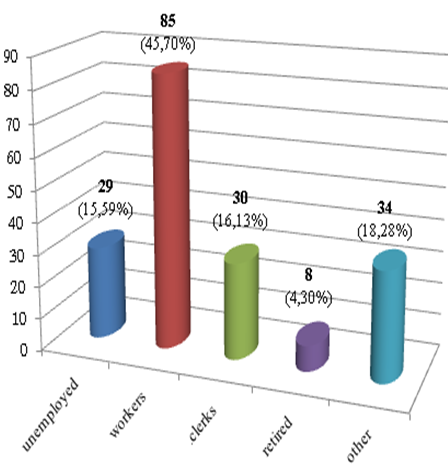 | Figure 2. Profession of the Father |
5.2. Parents’ Education Level
 | Figure 3. Education of the Father |
 Regarding the education of the father, it is obvious that the fathers with high school education are dominant with 66.7%, and 44.27% of them have vocational high school education, while 22.40% are gymnasium graduates. The fathers with higher or university education appear less frequently, and only 1 father has a master’s degree. The association with the personal data, expectedly shows (chi-square test, p<0.05) a higher number of fathers only with primary school education with regard to the students from the rural areas Noticeable (chi-square test, p <0,01) Frequent presence of primary education in Turkish fathers (20.00%) compared with the Macedonians (3.75%), and frequent high education in Albanian fathers (21.79%) in comparison with all other nationalities. When we talk about high school, Macedonian fathers dominate the secondary vocational education (72.50%), compared with the Albanians (26.92%) and Turks (13.33%). On the other hand, high school education is significantly more common among fathers Albanians (30.77%) and Turks (46.67%), against the Macedonians (6.25%). In the area of higher education do not appear differences between nationalities. The data do not indicate the conclusion that most of the students of the Faculty of Education are from families where the father has a vocational education and mostly is a worker by profession. They are poorly paid occupations, that certainly reflects the socio-economic status of the families, where in these families is very unfavorable.b) (Education of the mother)Regarding the education of the mother, we concluded that the situation with the mothers is very different, where primary school education is dominant (41.24% of the students covered in this research) and vocational high school (30.93% of the students covered in this research), as opposed to the education of the father, where the high school education was dominant. 8.25% of the students have a mother with higher education, 5.67% with university education and only one student has a mother with a master’s degree. Every seventh surveyed student has a mother with secondary or higher education. Intersections indicate that mothers of male students more frequently (chi-square test, p <0,05) are with primary education, while at female students more are with secondary vocational education. As expected, here mothers from rural areas more frequently (chi-square test, p <0,01) have only primary education, compared with mothers who live in towns. Education of mothers is similar with fathers education, where mothers with primary education are more present (chi-square test, p <0,01) at Albanian students (68.35%) and Turks (66.67%), against the Macedonians (5, 26%). The situation with secondary vocational education degree is completely opposite, extent that dominates in mothers with Macedonian nationality (61.84%) compared to mothers of students Albanians (8.86%) and Turks (3.33%) noticeable is something higher proportional representation of mothers with higher education in Albanian students and mothers with higher education among Turkish students. Regarding this issue, we can conclude that mothers of students have low education. Based on the given parameters from the educational level of the parents we can give a general conclusion that students who study in Faculty of Education (future teachers for elementary education and kindergarten teachers), come from families with low socio-economic status, i.e., poor families due occupations of parents who are very low paid. Conclusion regarding the categories of parental education and occupation (profession): students of Faculty of Education do not have significant intellectual background, respectively they come from very poor families with low socio-economic status.The results obtained from the research, which are a significant indicator, allow us to conclude that the education level of the mother, as well as the father, had insignificantly influenced the decision of the students to choose the teaching profession at the Faculty of Pedagogy.
Regarding the education of the father, it is obvious that the fathers with high school education are dominant with 66.7%, and 44.27% of them have vocational high school education, while 22.40% are gymnasium graduates. The fathers with higher or university education appear less frequently, and only 1 father has a master’s degree. The association with the personal data, expectedly shows (chi-square test, p<0.05) a higher number of fathers only with primary school education with regard to the students from the rural areas Noticeable (chi-square test, p <0,01) Frequent presence of primary education in Turkish fathers (20.00%) compared with the Macedonians (3.75%), and frequent high education in Albanian fathers (21.79%) in comparison with all other nationalities. When we talk about high school, Macedonian fathers dominate the secondary vocational education (72.50%), compared with the Albanians (26.92%) and Turks (13.33%). On the other hand, high school education is significantly more common among fathers Albanians (30.77%) and Turks (46.67%), against the Macedonians (6.25%). In the area of higher education do not appear differences between nationalities. The data do not indicate the conclusion that most of the students of the Faculty of Education are from families where the father has a vocational education and mostly is a worker by profession. They are poorly paid occupations, that certainly reflects the socio-economic status of the families, where in these families is very unfavorable.b) (Education of the mother)Regarding the education of the mother, we concluded that the situation with the mothers is very different, where primary school education is dominant (41.24% of the students covered in this research) and vocational high school (30.93% of the students covered in this research), as opposed to the education of the father, where the high school education was dominant. 8.25% of the students have a mother with higher education, 5.67% with university education and only one student has a mother with a master’s degree. Every seventh surveyed student has a mother with secondary or higher education. Intersections indicate that mothers of male students more frequently (chi-square test, p <0,05) are with primary education, while at female students more are with secondary vocational education. As expected, here mothers from rural areas more frequently (chi-square test, p <0,01) have only primary education, compared with mothers who live in towns. Education of mothers is similar with fathers education, where mothers with primary education are more present (chi-square test, p <0,01) at Albanian students (68.35%) and Turks (66.67%), against the Macedonians (5, 26%). The situation with secondary vocational education degree is completely opposite, extent that dominates in mothers with Macedonian nationality (61.84%) compared to mothers of students Albanians (8.86%) and Turks (3.33%) noticeable is something higher proportional representation of mothers with higher education in Albanian students and mothers with higher education among Turkish students. Regarding this issue, we can conclude that mothers of students have low education. Based on the given parameters from the educational level of the parents we can give a general conclusion that students who study in Faculty of Education (future teachers for elementary education and kindergarten teachers), come from families with low socio-economic status, i.e., poor families due occupations of parents who are very low paid. Conclusion regarding the categories of parental education and occupation (profession): students of Faculty of Education do not have significant intellectual background, respectively they come from very poor families with low socio-economic status.The results obtained from the research, which are a significant indicator, allow us to conclude that the education level of the mother, as well as the father, had insignificantly influenced the decision of the students to choose the teaching profession at the Faculty of Pedagogy. 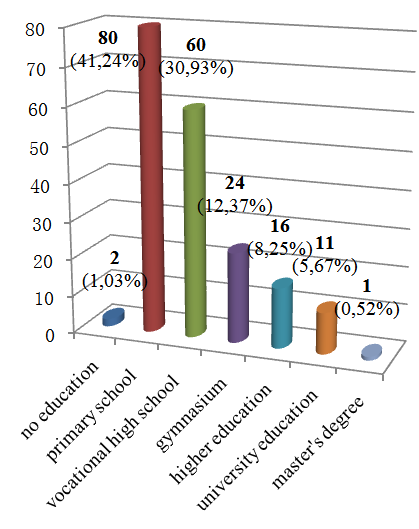 | Figure 4. Education of the mother |
5.3. Difficulty and Responsibilities of the Teaching Profession
- We were also interested in the opinions of the students about the difficulty and responsibilities of the profession, as well as how attracted they are to it.Almost with no exception, (98.45%) the students covered in the research believe that the teaching profession requires a lot of responsibility, and the majority (58.55%) of them characterize it as “a highly responsible and difficult”. The students of the elementary school studies (chi-square test, p<0.05) rate the teaching profession as more responsible and more difficult than their colleagues of the preschool studies. The association of this question with other personal data does not show statistically significant relations. The answers indicates to the conclusion that students regardless of gender, place of residence and ethnicity have the opinion that this profession has a great responsibility and weight. This leads to another conclusion that future teachers see themselves as responsible teachers who will diligently pursue the teaching profession, and seeing it in a social context has a great importance for the young generations. Such attitudes are very important, because only the responsible teacher can create responsible students. Very negligible number of respondents believe that the teaching profession is easy. Our conclusion to this response is that they do not have enough knowledge of the complexity of the profession, or with other words their opinion is that teachers perform a very easy job, as it is not so in practice. These data can serve as a good indicator that we need to work on raising awareness of young people to the profession by accepting full responsibility.Different opinions between students from the elementary school and pre-school education group, is due to the widespread perception that teachers in preschool institutions have less responsible job than teachers, that is easier to work with children from a younger age than with older students.
 | Figure 5. Difficulty and Responsibilities of the Teaching Profession |
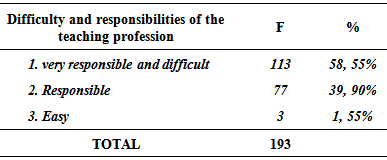
5.4. The Attractiveness of the Teaching Profession
- The dispersion of the answers to this question is quite similar to the previous. Over 95% of the students, covered in this research, agree that the teaching profession is attractive, and the majority of them (57.51%) consider this profession to be “attractive”, while a slightly lower number (39.38%) consider it to be “a somewhat less attractive” profession. The association with the personal data does not indicate significant differences regarding the responses.
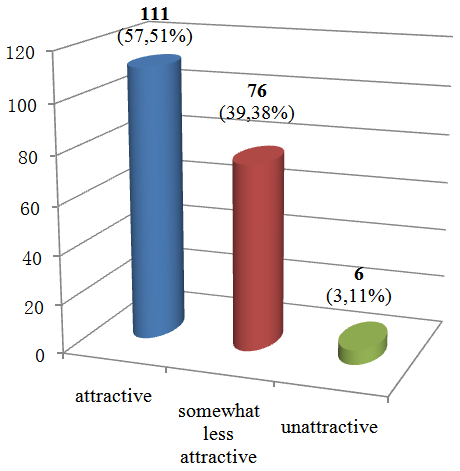 | Figure 6. The Attractiveness of the Teaching Profession |
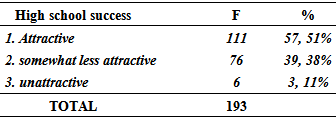 On the other hand, over 41% of the respondents think that the teaching profession, in comparison to other professions in the Macedonian society, is not very attractive, i.e. appealing. The number of students, who think that the teaching profession is appreciated, and therefore attractive for studying, is not to be neglected. The respondents, who believe in the opposite, are most probably influenced by the diminishing authority of the teacher, as well as by the fact that the dignity of the teacher is disfigured from a number of reasons: disrespect by the parents, as well as the social lack of motivation due to the low salaries, etc.If you carefully analyze the data from the table presented under number 2 and 3, it can be concluded that over 41% of surveyed believe that the teaching profession compared to other professions in society, is not much attractive. Of course it is a neglect number of those who are of the opinion that being a teacher is a regarded profession, hence attractive for study. Surveyed who has opposite belief, probably are guided by the collapse of the authority of the teacher, also dignity is more and more threatened, because a number of reasons: lack of respect by the parents and no social motivation, because of low wages. This research is enough to encourage the initiative to get back the authority of the teacher and adhering to a greater extent than is today. This unattractiveness also retreats other consequences. In addition, large number of students in secondary education have relatively low success, which further is reflected in their studies and in the quality of their education. A very small number of students with excellent solid success decide to be teachers in the future, which can be a social problem in the future. On the contrary, because of the responsibility and importance that this profession has within each society, teachers need to select the best students. A common practice is excellent students decide to be future doctors, dentists or economists, managers, IT etc…▪ Type of high school education of the studentsRegarding the type of high school education of the students who try to enroll at the Faculty of Pedagogy, the answers in the questionnaire lead us to conclude that the students with gymnasium (55.15%) and with a vocational high school (44.85%) are represented relatively equally. There is a tendency of a slight rise of the students with gymnasium in comparison to the students with vocational high school (regardless of the type of studies). The association with their nationality reveals a higher prevalence (chi-square test, p<0.01) of students with finished gymnasium from Turkish nationality (90% with gymnasium and only 10% with vocational high school), unlike the Macedonian students (41.33% gymnasium, 58.67% vocational high school). This proportion is insignificant as far as the Albanian students are concerned, and is proportional throughout the complete sample. Our opinion on ethnic turkish students who complete secondary school are determined to work, while the Macedonian students were equally determined to study even though they have completed high school.
On the other hand, over 41% of the respondents think that the teaching profession, in comparison to other professions in the Macedonian society, is not very attractive, i.e. appealing. The number of students, who think that the teaching profession is appreciated, and therefore attractive for studying, is not to be neglected. The respondents, who believe in the opposite, are most probably influenced by the diminishing authority of the teacher, as well as by the fact that the dignity of the teacher is disfigured from a number of reasons: disrespect by the parents, as well as the social lack of motivation due to the low salaries, etc.If you carefully analyze the data from the table presented under number 2 and 3, it can be concluded that over 41% of surveyed believe that the teaching profession compared to other professions in society, is not much attractive. Of course it is a neglect number of those who are of the opinion that being a teacher is a regarded profession, hence attractive for study. Surveyed who has opposite belief, probably are guided by the collapse of the authority of the teacher, also dignity is more and more threatened, because a number of reasons: lack of respect by the parents and no social motivation, because of low wages. This research is enough to encourage the initiative to get back the authority of the teacher and adhering to a greater extent than is today. This unattractiveness also retreats other consequences. In addition, large number of students in secondary education have relatively low success, which further is reflected in their studies and in the quality of their education. A very small number of students with excellent solid success decide to be teachers in the future, which can be a social problem in the future. On the contrary, because of the responsibility and importance that this profession has within each society, teachers need to select the best students. A common practice is excellent students decide to be future doctors, dentists or economists, managers, IT etc…▪ Type of high school education of the studentsRegarding the type of high school education of the students who try to enroll at the Faculty of Pedagogy, the answers in the questionnaire lead us to conclude that the students with gymnasium (55.15%) and with a vocational high school (44.85%) are represented relatively equally. There is a tendency of a slight rise of the students with gymnasium in comparison to the students with vocational high school (regardless of the type of studies). The association with their nationality reveals a higher prevalence (chi-square test, p<0.01) of students with finished gymnasium from Turkish nationality (90% with gymnasium and only 10% with vocational high school), unlike the Macedonian students (41.33% gymnasium, 58.67% vocational high school). This proportion is insignificant as far as the Albanian students are concerned, and is proportional throughout the complete sample. Our opinion on ethnic turkish students who complete secondary school are determined to work, while the Macedonian students were equally determined to study even though they have completed high school. 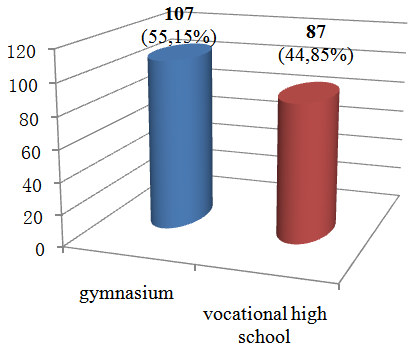 | Figure 7. Type of high school education of the students |
 ▪ High school successNearly half of the students covered in the research (49.74%) enrolled at the Faculty with a very good success in high school, and the majority of the students from the remaining half had an excellent success (38.97%), and a low number of students had a good success (11.28%). The association with gender expectedly revealed that (chi-square test, p<0.01), the female students (45.34%) enroll with an excellent success more often than their male colleagues (8.82%). On the other hand, there are more male than female students with very good success (male 67.65%, female 45.96%) or good success (male 23.53%, female 8.70%). The association of the high school success with the other personal data did not reveal a statistically significant relation.
▪ High school successNearly half of the students covered in the research (49.74%) enrolled at the Faculty with a very good success in high school, and the majority of the students from the remaining half had an excellent success (38.97%), and a low number of students had a good success (11.28%). The association with gender expectedly revealed that (chi-square test, p<0.01), the female students (45.34%) enroll with an excellent success more often than their male colleagues (8.82%). On the other hand, there are more male than female students with very good success (male 67.65%, female 45.96%) or good success (male 23.53%, female 8.70%). The association of the high school success with the other personal data did not reveal a statistically significant relation. | Figure 8. High school success |
 | Figure 9. Motivation to choose the profession |

6. Conclusions
- The general conclusion of our research is that the students who decide to be future teachers and educators come from the low socioeconomic layers, i.e. from families in which the parents have vocational high school education at the most. Apart from this, the research showed us that the students – future teachers come almost as equally from the gymnasiums as from the vocational high schools. Also, regardless of the gender, the place of residence and the ethnicity, they believe that the teaching profession is highly responsible and very difficult. This leads us to conclude that the future teachers see themselves as responsible teachers who will do their jobs professionally, and seeing in the social context this is very important for the young generations. This means that education is becoming a necessity for the further development of the social awareness from every aspect. On the other hand, as we have already said, knowledge is attained through the education process, and this is a certain guarantee for the healthy development both of the personality and the society in general. It is well known that the teaching profession, as a very responsible one, initiates responsibility, expertise and professionalism, as well as awareness for a continuous professional development. These opinions are very important, because the teacher is and always will be the pillar in the development of the personality in every aspect: moral, aesthetic, work, emotional, etc. Only responsible teachers can create responsible students. The teacher asserts great associative power in all areas of the social community, as the principle creator and reformer of the social awareness and conscience. A very negligible number of respondents believe that the teaching profession is easy. Our conclusion, in this context, is that these respondents are not familiar with the complexity of the profession, or in other words, they believe that the teachers have a very easy job, which is not the same case in practice. The vast majority of the students have enrolled at the Faculty of Pedagogy motivated by the love of the profession teacher, as opposed to the very low number of students who have enrolled with the motive “to graduate with ease”. We consider this fact to be very important because there is a popular opinion that students enroll at the Faculty of Pedagogy, not only in Skopje, but also in the other cities (Stip, Bitola and Tetovo) because they consider it not very difficult.Hence, we are especially glad that the main motive to enroll at the Faculty of Pedagogy is the love for children and the teaching profession. Our research revealed that the trend for students from families with a lower socioeconomic status to enroll at the Faculty of Pedagogy is persistent not only in Skopje, but also in the other cities in the Republic of Macedonia. At the same time, our research confirmed that the social stratification has the deciding and principle role in determining the future education professions. On the other hand, usually children from families with high socioeconomic status continue to the more prestigious professions, which are certainly well paid and more appreciated, such as lawyers, economists, dentists, doctors, and other experts. Very often children inherit their parents profession, especially if it is a prestigious, attractive and well-paid profession. Unfortunately, the teaching profession in the Republic of Macedonia is poorly paid and non - estimated, also less prestigious in the society. On the other hand, the pronounced tendency for enrolment of students from the vocational high schools is gradually decreasing, because our research showed us that in recent years there is a proportional distribution between the students from vocational high schools and gymnasiums. Nevertheless, the high school success of many students is relatively lower, which reflects in the course of their studies and the quality of their education. There is a very low number of students with an excellent high school success who decide to become teachers, which might become a social problem in the future. On the contrary, only the best students should be chosen to become teachers, because of the responsibility and the importance of this profession within every society.We will end this paper with the ingenious quote of the Russian author, philosopher and one of the greatest novelists of all times, Lev Nikolayevich Tolstoy: “If teachers love their profession and work, if they love their students as they love their mothers and fathers, they are better than the teachers who have read all the books, but love neither their work, nor their students. When teachers combine the love for their work and the love for the students, they are perfect teachers”. (Zlebnik, 1981:157).
 Abstract
Abstract Reference
Reference Full-Text PDF
Full-Text PDF Full-text HTML
Full-text HTML